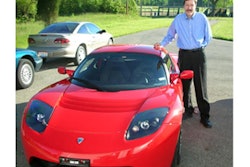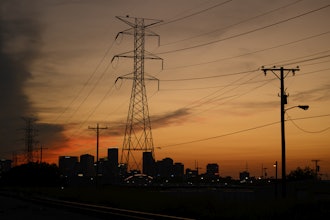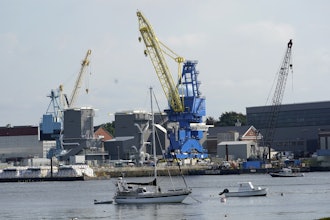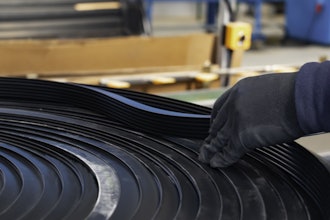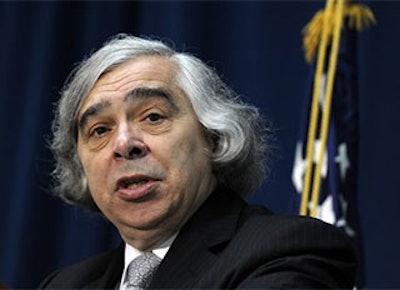
WASHINGTON (AP) — Energy Secretary Ernest Moniz said Thursday that coal will continue to play a major role in meeting America's energy needs even as the Obama administration seeks to reduce carbon emissions and combat global warming.
 |
|
In this May 21, 2013 file photo, Energy Secretary Ernest Moniz speaks after being sworn in as Energy Secretary, at the Energy Department in Washington. Moniz says coal will continue to play a role in meeting America’s energy needs even as the Obama administration seeks to reduce carbon emissions and combat global warming. In an interview with The Associated Press, Moniz refuted claims by Republicans and even some coal-state Democrats that the president’s climate plan would cripple the coal industry. (AP Photo/Susan Walsh, File) |
In an interview with The Associated Press, Moniz dismissed claims from Republicans and some coal-state Democrats that President Barack Obama's climate plan amounted to a war on coal. He said he and the president "strongly support an all-of-the above energy policy" that embraces traditional energy sources such as coal, oil and nuclear power, as well as renewables such as solar, wind and hydro.
"The president made clear that we anticipate that coal and other fossil fuels are going to play a significant role for quite some time on the way to a very low carbon economy," he said.
Specifically, the administration plans to offer up to $8 billion in loan guarantees for technologies that can keep carbon dioxide produced by power plants from being released into the atmosphere, Moniz said. Several "carbon capture" demonstration projects are now underway, including a large plant in Port Arthur, Texas, that began operations in December.
"It's not going to happen tomorrow, but I believe in this decade we will have demonstrated the viability of large-scale storage" of carbon-dioxide from industrial operations, Moniz said.
Obama's far-reaching plan would for the first time put limits on carbon pollution from new and existing power plants, while expanding development of renewable energy on public lands.
Forty percent of U.S. carbon emissions, and one-third of greenhouse gases overall, come from electric power plants, according to the federal Energy Information Administration. Nearly 40 percent of U.S. electricity is generated by coal.
House Speaker John Boehner, R-Ohio, said Thursday that the plan "will shutter power plants, destroy good-paying American jobs and raise electricity bills for families that can scarcely afford it. "
And Sen. Joe Manchin, D-W.Va., has called Obama's proposals "irresponsible" and said they would result in significant job losses in his coal-heavy state.
"The regulations the president wants to force on coal are not feasible," Manchin said.
He said the proposed regulations on coal cannot be met with existing technology.
Moniz said he was sympathetic to that point of view, saying a key part of the president's strategy is to push technical innovations such as carbon storage. "We have an aggressive technology department program that will lower the cost of doing that," he said.
He cited a study by the U.S. Geological Survey showing that the United States has the potential to store about 3 trillion tons of carbon dioxide in geologic basins throughout the country. The study, released this week, said the largest potential for storage is in Texas and the Southeast. Alaska and the Rocky Mountain states also have significant storage capacity.
The administration also will move more aggressively to make factories and appliances more energy efficient, Moniz said. Obama said he wants to avoid the equivalent of 3 billion tons of carbon pollution by 2030 through increased efficiency.
Environmental groups and congressional Democrats have complained that the White House was holding up a host of Energy Department regulations that would require appliances, lighting and buildings to use less energy. Many of the regulations, including proposed efficiency standards for commercial walk-in coolers and freezers, have been delayed for more than a year.
Moniz acknowledged the delay, but said, "The president's plan gives us a strong motivation to move these out quickly."
Moniz also pledged quick action on a slew of proposals to export liquefied natural gas. Just two projects have been approved in the past two years, a pace that energy companies call glacial.
"I have said, and I repeat, that we expect to have significant action this year on a case by case basis," Moniz said. "We understand there are lots of people waiting with capital ready to come off the sidelines and start investing in projects."
___
Follow Matthew Daly on Twitter: https://twitter.com/MatthewDalyWDC




